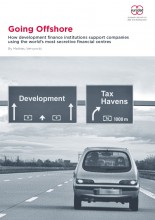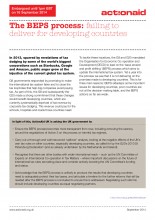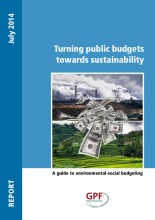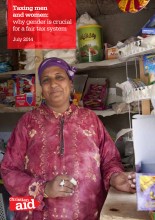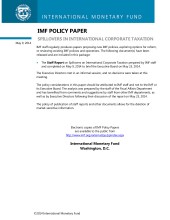On September 19 2014, Global Policy Forum, in collaboration with MISEREOR, hosted an expert panel discussion that raised many strategic questions on the topic of financing the post-2015 sustainable development agenda and the sustainable development goals. Many of the answers to these questions depend on the outcomes of negotiations in the run up to the UN Financing for Development Conference in July and the expected UN Summit to pass a post-2015 agenda in September 2015. In the meantime, however, the [...]
Development Finance & Tax Justice - Archive
Secret Tax Deals of Multinationals Exposed
Based on a review of 28,000 pages of leaked documents the International Consortium of Investigative Journalists and a team of more than 80 journalists from 26 countries say, international companies such as IKEA, FedEx, Pepsi and Procter & Gamble have channeled hundreds of billions of dollars through Luxembourg and slashed billions from their global tax bills. The leaked documents come from Pricewaterhouse Coopers in Luxembourg and include hundreds of private tax rulings – so-called “comfort letters” – that Luxembourg provides [...]
How development finance institutions support companies using the world’s most secretive financial centres
Developing countries lose billions of dollars every year through tax avoidance and evasion. Tax havens play a pivotal role in this by providing low or no taxation and by promising secrecy, allowing businesses to dodge taxes and remain largely unaccountable for their actions. Development Finance Institutions (DFIs) are government-controlled institutions that, as this report shows, often support private sector projects that are routed through tax havens, using scarce public money. By supporting projects in this way, DFIs are helping to [...]
The World Bank’s Doing Business Report has been criticized by a global coalition of Civil Society Organizations to contain major methodological flaws. Such shortcomings threaten to undermine not only the report’s credibility but also the World Bank’s effectiveness in achieving its goals. Experts argue that a comprehensive overhaul of the existing indicators in the report will be necessary if it is still to serve as a useful instrument to assess the contribution of business to global development. Moreover, there is [...]
After six weeks in office, the new U.N. High Commissioner for Human Rights (UNHCHR) Zeid Ra’ad al-Hussein of Jordan launched a blistering attack on member states for insufficient funding, thereby forcing operations in his office to the breaking point “in a world that seems to be lurching from crisis to ever-more dangerous crisis," writes Thalif Deen in a recent piece for IPS. “I have been asked to use a boat and a bucket to cope with a flood,” he said [...]
"The debates on the Post 2015 Agenda offer the opportunity to reconsider development in light of the new realities and to overcome the old and often still paternalistic approaches of development policy. Therefore, a truly universal Post 2015 Agenda must not just become an updated set of MDGs. It should contain universal sustainability goals and a program for structural transformation which defines the necessary financial, regulatory and institutional means of implementation in all countries of the world, and this in [...]
The long struggle of governments to combat tax evasion and avoidance by multinational enterprises continues unabated. However, if the most recent developments in negotiations around the OECD’s anti-BEPS project and discussions concerning the upcoming G20 summit in Australia in November are any indication, it does not look as if any significant progress will be made to turn the tide of tax abuse – at least not in the near future. Indeed, more entrenched problems, such as tax competition among countries [...]
"The primary role of the Investment Division of UNCTAD should be to provide to developing countries alternatives to the unbalanced provisions of international investment treaties" say 262 organizations from over 150 countries in a letter to Dr. Mukhisa Kituyi, secretary general of the UN body specializing in trade and development. The signatories worry about "the growing restrictions on policy space resulting from the investment protection rules" that threaten to impede the development of countries in the Global South. It is [...]
Anonymous company owners and the threat to American interests
Owners of anonymous companies registered in U.S. states are ripping off innocent people and businesses across America, says a new report by Global Witness. Drawing on 22 cases involving anonymous companies from 27 states, The Great Rip Off shows how fraudsters, mobsters, money-launderers, tax-evaders and corrupt politicians are able to use anonymously-owned American companies to cover their tracks and evade the authorities.
Progressive Realization
The obligation of progressive realization has long been central to understanding how economic, social, and cultural (ESC) rights recognized in the present International Covenant on Economic, Social and Cultural Rights (ICESCR) should be achieved. Indeed, at the time the ICESCR was adopted, it was considered appropriate to underscore that the right to health, education and social security, among other rights, could not be fully and immediately realized everywhere in the world. In her blog, Helena Hofbauer from the International Budget [...]
A coalition of 33 European civil society organizations, Global Policy Forum among them, recently submitted a critical contribution to the ‘European Commission's consultation regarding the potential economic consequences of country-by-country reporting’ (CbCR) under the so-called Capital Requirements Directive IV. The purpose of the consultation is to collect information and obtain input from all interested stakeholders on the potential economic consequences of public disclosure by banks and investment firms of CbCR information. It aims to highlight in particular the effects of [...]
Failing to deliver for developing countries
ActionAid UK has released a report that outlines why the OECD’s base erosion and profit sharing (BEPS) project, which aims to put a halt to tax dodging, will not work to the benefit of poor countries. Three reasons for this are identified: BEPS sidesteps many important issues for poor countries, developing countries are not part of the negotiations around new international tax rules, and the proposed BEPS solutions are weak and in many cases impractical. This report comes in the [...]
UN takes a big step forward
On September 9, 2014 the UN General Assembly passed a landmark resolution that mandates the UN to create a “multilateral legal framework for sovereign debt restructuring”. Promoted by the G77 countries and triggered by the aggressive "vulture funds" lawsuits against Argentina, this resolution could be a game changer for the way future debt crises are managed. First and foremost, it has shifted the forum for political debate away from the International Monetary Fund (IMF) towards the UN. However, shamefully the [...]
Establishes Multilateral Framework for Countries to Emerge from Financial Commitments
n 9 September 2014 the General Assembly adopted an important resolution on sovereign debt restructuring that would establish an intergovernmental negotiation process aimed at increasing the efficiency, stability and predictability of the international financial system.
Public-Private-Partnerships have become a mainstream development model in recent years. On the one hand, after the financial crisis contributions from the private sector are envisaged to fill the gap of decreasing official development assistance from states. On the other hand, an increasing share of development finance is channeled to businesses and financial institutions. NGOs criticize that private sector development priorities are not aligned with national development strategies and emphasize the conflict of interests between making profits and reducing poverty and [...]
Earlier than expected, the Organisation for Economic Co-operation and Development (OECD) published comprehensive details on the common reporting standard for automatic exchange of financial information this week. The new reporting standard could actually mark a big step towards “a world in which tax cheats have nowhere left to hide” – as an OECD official puts it. In reality, it leaves enough loopholes to exclude developing countries from the benefits of such an agreement. Since the automatic exchange of information will [...]
In an open letter 78 scientists from 22 countries urge political decision makers to establish an insolvency procedure for indebted states. In the appeal they denounce political inactivity in the face of emerging and ongoing crises and the refusal of decision makers to learn from past mistakes. If not implemented, the world would have to pay a high price in the form of an increasing social and economic divide between rich and poor as well as unnecessarily high losses for [...]
by Bodo Ellmers
Legitimacy and impartiality in focus
The United Nations Conference on Trade and Development (UNCTAD) is about to deliver a concept for a new debt workout mechanism. The concept has been developed by a multi-stakeholder expert group that has been convened regularly by UNCTAD since early 2013. Thanks to this new concept, the UN system is finally promising to deliver what developing countries have been calling for since the 1971 Action Programme of Lima – namely, orderly [...]
A guide to environmental-social budgeting
International development policy is at a crossroads. By September 2015, governments plan to adopt a Post-2015 Development Agenda – an agenda that is supposed to shape the fundamental priorities, goals and strategies for development policy beyond 2015. In parallel, governments have agreed to develop a set of Sustainable Development Goals integrating all dimensions (social, economic and environmental) of sustainable development and being applicable to all countries in the world. Forming one coherent Post-2015 Agenda, including the SDGs, affects all policy [...]
Why gender is crucial for a fair tax system
The latest report of the British NGO Christian Aid “Taxing Men and Women: why gender is crucial for a fair tax system” deals with the different effects of tax systems in men and women as well as possibilities how prudent fiscal and tax policy can contribute to gender equality. Whereas a lot of literature exists on the consideration of gender aspects on the spending side of national budgets, this report marks a first step to analyze state revenues with regard [...]
Yesterday, a broad alliance of civil society organizations including Global Policy Forum sent an open letter to the European Commission to protest against the assessment of country by country reporting by PricewaterhouseCoopers.
Since PricewaterhauseCoopers - one of the "Big Four" audit firms - is a known opponent of public country by country reporting, letting them assess this crucial tool for preventing corporate tax dodging would be the same logic as to set the fox to guard the henhouse.
During the current session of the UN Human Rights Council the Special Rapporteur on extreme poverty and human rights, Philip Alston, presented a report by his predecessor Magdalena Sepúlveda Carmona concerning fiscal and tax policy, poverty and human rights. The report stresses the role of fiscal and taxation policy as a major determinant in the enjoyment of human rights and makes some reccommendations how to make the global tax system more effective, equitable and transparent.
The International Monetary Fund (IMF) yesterday released a new policy paper “Spillovers in International Corporate Taxation”. The paper analyses the effects tax rules can have on other countries' tax systems. These spillovers can result in significant tax losses for developing countries and thereby diminish their ability to realize human rights. The current global tax system allows transnational corporations to reduce their global corporate taxes to almost zero, according to the report. By highlighting the severe shortcomings of the institutional framework [...]
Aldo Caliari, Director of the Rethinking Bretton Woods Project, argues in an article published by the United Nations Non-Governmental Liaison Service (UN-NGLS) that financial and monetary reform should be a fundamental part of post-2015 development agenda. Taking this into consideration, the new agenda was a political opportunity to avoid following the imperfect path of the Millennium Development Goals (MDGs) and to include necessary means of implementation. On top of that, Caliari presents thoughts on key areas like financial regulations and [...]
The World Bank recently initiated a revision of its annual Doing Business Report by an Independent Panel of experts. Civil society criticizes the Doing Business Report for putting business interests ahead of human rights by one-sidedly promoting deregulatory policies. E.g. the International Trade Union Congress (ITUC) found that countries that fail to respect workers’ rights are praised by the report. In fact, the Independent Panel made some recommendations to address the shortcomings of Doing Business. Nevertheless, they seem to be [...]

